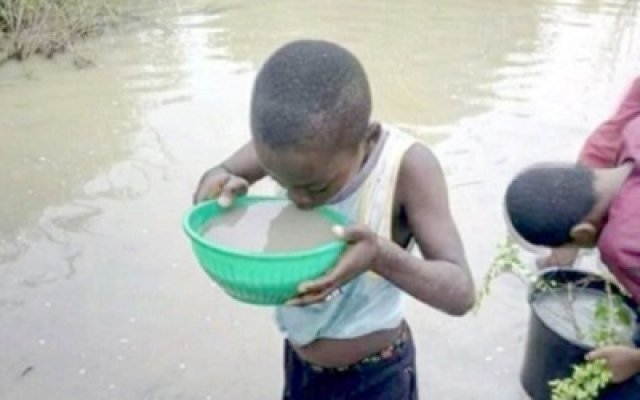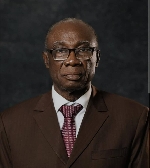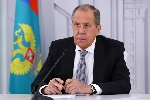I see the back story - Elizabeth Ohene writes
Feature Article

It might well be my age, but I realise that quite often what I see in some of these videos that the media people unleash on us is different from what they are meant to show.
The camera pans to a brown, muddy pond of water and a group of mostly women and children are fetching this water into buckets, pots and gallons of various sizes. Then the camera zooms in on a young boy or elderly woman who takes a calabash and scoops some of the muddy water and drinks.
The voice of the reporter tells us which village or town in Ghana in which the scene is being filmed and then individuals from the group of people are interviewed.
“This is the water we are forced to drink, we were promised that we would be given pipe-borne water and yet, here we are still having to drink this water. You know we share it with our animals and we have to walk for miles to get here. We are appealing to the government to come to our aid. We don’t know why we have been ignored all these years. We are also Ghanaians and we should also get the development that we see other places getting every day. We have been deceived so often that we are not going to vote any more. No water, no vote.”
Our intrepid reporter then cuts to Candidate Akufo-Addo or Candidate Bawumia telling a crowd that if they are voted into power, their government would make the provision of potable water to every community their priority. The camera cuts back to the muddy water and the calabash of brown water being taken to someone’s mouth.
Must they drink muddy water?
Yes, I am outraged and I am disgusted that anyone is drinking such muddy water in Ghana in the year of our Lord 2019. Yes, the thought does cross my mind whether we should have given up going to AFCON 2019 so that the appearance fee paid to the Black Star players could be used to provide water for that particular village. I don’t linger on this thought.
Yes, my mind goes to the Auditor-General’s report and the regular findings of malfeasance among public officials and I wonder if those monies couldn’t have paid for the water system for the village. But again I don’t linger very long on this thought.
What outraged me and the reason I am disgusted is not because corruption in high places is linked to muddy drinking water in villages or governments not delivering on its promises.
I am outraged because there is no reason for anyone to drink such water in Ghana in the year of our Lord 2019, period. When I was growing up in this country, very, very few communities had pipe-borne water. Most people walked to fetch water from rivers and streams. I did as a child. I admit that in my village of Abutia, the stream was clean and clear, at least to the eye.
Can’t they treat the water?
In most homes in this country, whether the source of water was clean and clear or muddy and dirty, they had their drinking water set aside, and they did not scoop water from muddy pools to drink. People filtered their water and they boiled the water that is to be set aside for drinking. People harvested rain water for drinking.
The importance of drinking clean water was emphasised over and over again. In primary schools and in churches, you were encouraged to boil the water being set aside for drinking. I know homes where a clean piece of calico was always set aside to strain water into the baked clay coolers in which drinking water was kept.
Now that everybody has a mobile phone and we all know what is happening at the other side of the world, are we to understand that we have become so helpless that we are unable to do anything about unsafe drinking water?
Are we now so conditioned to finding someone to blame for everything that we would rather drink muddy water to be filmed on camera instead of boiling or filtering our water to drink?
It might well be that we have such a venal political class that their actions and non-actions have led to many communities not having safe drinking water, but I fail to see what there is to gain from showing the world that you drink filthy, potentially poisonous water.
It seems to me that the journalists are also now often on such a determined war for a particular agenda that they never stop to ask simple questions. Why are you drinking the muddy water without filtering or boiling it? Why are you polluting your source of water in the village?
Even if no one embezzled one cedi of public money, it is not likely every community will get safe potable water within the next year. Why don’t we, therefore, learn to deal with the muddy water instead of advertising our helplessness?
I have been on various campaigns around this country and I can claim intimate knowledge of some parts; and I have been surprised by the priorities of many communities.
I know many communities that would choose a tarred road, electricity or community centre before a pipe-borne water system, and definitely before toilets and school buildings. That might not be my order of priorities, but I have learnt the hard way to respect people’s choices.
I have heard it said that one of the reasons the authorities are hesitant to ban sachet and plastic water containers is that they fear that much of our water sources are polluted and people have to rely on the sachet and plastic water for safe drinking water. In other words, we are intent on looking for the easy way out of every situation.
Drinking muddy water on camera might serve the purpose of a programme maker, it might embarrass a government, but it says more about the helplessness and primitive nature of the community.
Let’s campaign by all means for the provision of potable water for everybody. When I see people being filmed drinking muddy water, what I see is a determination to portray a helpless and primitive people. That is the back story. That is what the “Western Media” used to be known and accused of. I have spent a lifetime fighting that.
BY: Elizabeth Ohene
The camera pans to a brown, muddy pond of water and a group of mostly women and children are fetching this water into buckets, pots and gallons of various sizes. Then the camera zooms in on a young boy or elderly woman who takes a calabash and scoops some of the muddy water and drinks.
The voice of the reporter tells us which village or town in Ghana in which the scene is being filmed and then individuals from the group of people are interviewed.
“This is the water we are forced to drink, we were promised that we would be given pipe-borne water and yet, here we are still having to drink this water. You know we share it with our animals and we have to walk for miles to get here. We are appealing to the government to come to our aid. We don’t know why we have been ignored all these years. We are also Ghanaians and we should also get the development that we see other places getting every day. We have been deceived so often that we are not going to vote any more. No water, no vote.”
Our intrepid reporter then cuts to Candidate Akufo-Addo or Candidate Bawumia telling a crowd that if they are voted into power, their government would make the provision of potable water to every community their priority. The camera cuts back to the muddy water and the calabash of brown water being taken to someone’s mouth.
Must they drink muddy water?
Yes, I am outraged and I am disgusted that anyone is drinking such muddy water in Ghana in the year of our Lord 2019. Yes, the thought does cross my mind whether we should have given up going to AFCON 2019 so that the appearance fee paid to the Black Star players could be used to provide water for that particular village. I don’t linger on this thought.
Yes, my mind goes to the Auditor-General’s report and the regular findings of malfeasance among public officials and I wonder if those monies couldn’t have paid for the water system for the village. But again I don’t linger very long on this thought.
What outraged me and the reason I am disgusted is not because corruption in high places is linked to muddy drinking water in villages or governments not delivering on its promises.
I am outraged because there is no reason for anyone to drink such water in Ghana in the year of our Lord 2019, period. When I was growing up in this country, very, very few communities had pipe-borne water. Most people walked to fetch water from rivers and streams. I did as a child. I admit that in my village of Abutia, the stream was clean and clear, at least to the eye.
Can’t they treat the water?
In most homes in this country, whether the source of water was clean and clear or muddy and dirty, they had their drinking water set aside, and they did not scoop water from muddy pools to drink. People filtered their water and they boiled the water that is to be set aside for drinking. People harvested rain water for drinking.
The importance of drinking clean water was emphasised over and over again. In primary schools and in churches, you were encouraged to boil the water being set aside for drinking. I know homes where a clean piece of calico was always set aside to strain water into the baked clay coolers in which drinking water was kept.
Now that everybody has a mobile phone and we all know what is happening at the other side of the world, are we to understand that we have become so helpless that we are unable to do anything about unsafe drinking water?
Are we now so conditioned to finding someone to blame for everything that we would rather drink muddy water to be filmed on camera instead of boiling or filtering our water to drink?
It might well be that we have such a venal political class that their actions and non-actions have led to many communities not having safe drinking water, but I fail to see what there is to gain from showing the world that you drink filthy, potentially poisonous water.
It seems to me that the journalists are also now often on such a determined war for a particular agenda that they never stop to ask simple questions. Why are you drinking the muddy water without filtering or boiling it? Why are you polluting your source of water in the village?
Even if no one embezzled one cedi of public money, it is not likely every community will get safe potable water within the next year. Why don’t we, therefore, learn to deal with the muddy water instead of advertising our helplessness?
I have been on various campaigns around this country and I can claim intimate knowledge of some parts; and I have been surprised by the priorities of many communities.
I know many communities that would choose a tarred road, electricity or community centre before a pipe-borne water system, and definitely before toilets and school buildings. That might not be my order of priorities, but I have learnt the hard way to respect people’s choices.
I have heard it said that one of the reasons the authorities are hesitant to ban sachet and plastic water containers is that they fear that much of our water sources are polluted and people have to rely on the sachet and plastic water for safe drinking water. In other words, we are intent on looking for the easy way out of every situation.
Drinking muddy water on camera might serve the purpose of a programme maker, it might embarrass a government, but it says more about the helplessness and primitive nature of the community.
Let’s campaign by all means for the provision of potable water for everybody. When I see people being filmed drinking muddy water, what I see is a determination to portray a helpless and primitive people. That is the back story. That is what the “Western Media” used to be known and accused of. I have spent a lifetime fighting that.
BY: Elizabeth Ohene
Source: Emmanuel Mensah
Trending Features

In defence of Act 794: Context, competitiveness and the real path to mining value
13:59
KGL's Resilience, impact in 2025 a remarkable benchmark for corporate Ghana
09:06
Is Ghana’s Special Prosecutor truly independent? Legal analysis raises key questions
14:39
Russia–Africa:New horizons for old friends
09:23
Justice for sale: When poverty becomes a barrier to the Rule of Law
10:13




